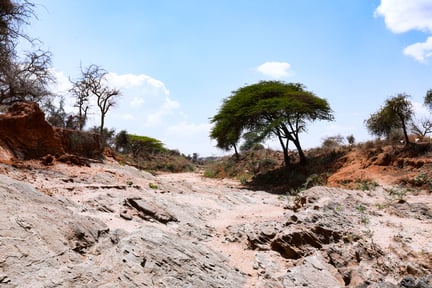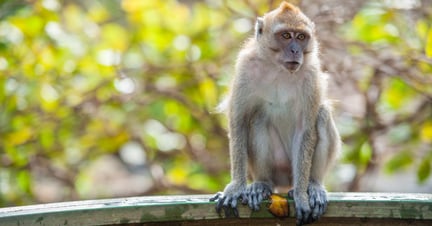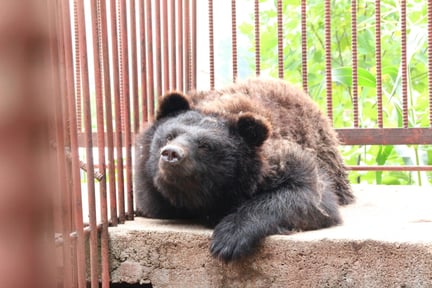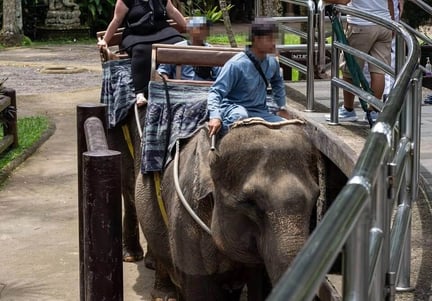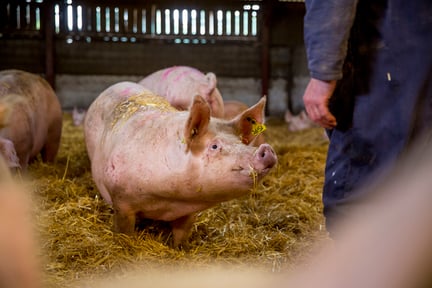
Subsidising Cruel Factory Farms: Taxpayers funding intensive farming and deforestation
Press release
Governments around the world, including China, the US, India and the EU, are fuelling deforestation by subsidising factory farms – a new report from World Animal Protection reveals.
Launching ahead of COP30, ‘Subsidising Factory Farm Harm’ unpacks the magnitude of subsidies flowing into factory farms, leaving small-scale farmers behind and farmed animals trapped in cruel factory farms.
Agriculture receives among the most subsidies of any sector globally, second only to fossil fuel.1 The sector also remains a key contributor to global greenhouse gas emissions (34%2), building a compelling case for governments attending COP30 to shift away from harmful intensive farming subsidies if they want to assist in meeting the Paris Agreement target.
We can’t keep pouring taxpayer money into food systems that are not fit for purpose. Factory farms pollute our climate, destroy biodiversity and put animals through immense suffering. The future is in fair farms, not factory farms.
Instead of supporting small-scale, sustainable farming, subsidies are supercharging the market power of ‘big meat’. Meaning consumers aren’t only lining these businesses’ pockets at tax time, but at the checkout too.
Governments need to redirect subsidies away from factory farming. Public finance should drive sustainable and humane food systems, but right now we’re being locked into harmful ones
Key facts:
- If left unchecked, agriculture is projected to produce 52% of global greenhouse gas emissions by 2053.
- The subsidised production of food drives land expansion that causes around 14% of global deforestation. The key drivers of this expansion are beef, soybeans (mostly used for animal feed) and palm oil.
- In Brazil, home to COP30, the subsidies granted to the beef sector are on average roughly $3.1 billion USD per year, when the industry pays only about $3.8 billion USD annually in taxes.
The report identifies a major transparency gap in how agricultural subsidies are reported globally. Most major subsidising economies, including the US, China and India, do not disclose exact figures for subsidies directed to animal production.
In the EU, where detailed data exists for agricultural subsidies, total financial support for industrial farming reached approximately $88.5 billion USD between 2021 and 2023. The report shows that if half this amount were redirected toward plant-based diets and sustainable farming systems, each year it would save 25.9 million megalitres of water and free 19.4 million hectares of land in the EU alone.
Factory farming is a major contributor to the planet’s environmental degradation and some of the worst animal welfare abuses, confining 76 billion animals annually in barren and overcrowded facilities.
The charity is calling on governments to move towards a humane and sustainable food system, by withdrawing subsidies to factory farming, and redirecting support to sustainable farming methods, such as agroecology.
Read the full report
Media enquiries: Please contact Hannah Smart at HSmart@worldanimalprotection.org.au
Related content
World Animal Protection Climate Change Hub
Discover everything that World Animal Protection is doing to tackle the climate crisis and what you can do to help.
Conference of the Parties (COP) Guide
Learn about the Conference of the Parties (COP) and how World Animal Protection advocates for animals in global climate and biodiversity discussions. Take action today!
Latest news
-
Wildlife tourism risks highlighted after Thailand monkey attack
News
A recent monkey attack in Thailand sparks renewed warnings about the dangers of wildlife encounters and calls for...
-
Historic bear bile farming ban brings hope for bears...
News
The Republic of Korea has banned bear bile extraction from 2026. Further action is now needed to protect...
-
Indonesia bans elephant riding in landmark welfare move
News
Indonesia announces an end to elephant rides, a major win for animal welfare and encourages ethical wildlife tourism.
-
Delay to EU-Mercosur deal creates space for animal welfare...
News
European Parliament delays Mercosur deal with court referral, offering advocacy space for animal welfare, One Health and deforestation...
